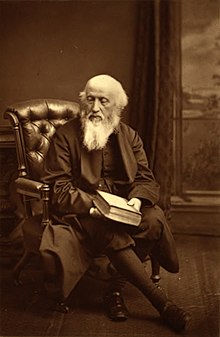
Back William Barnes (Dichter) German William Barnes Esperanto William Barnes Spanish William Barnes (écrivain) French ウィリアム・バーンズ (言語学者) Japanese William Barnes Dutch William Barnes NB William Barnes (poeta) Polish Барнс, Уильям Russian William Barnes Swedish
William Barnes | |
|---|---|
 Rev. William Barnes | |
| Personal details | |
| Born | 22 February 1801 Bagber, Dorset, England |
| Died | 7 October 1886 (aged 85) Winterborne Came, Dorset, England |
| Buried | St Peter's Church, Winterborne Came, Dorset, England |
| Nationality | English |
| Denomination | Anglican |
| Occupation |
|
| Alma mater | St John's College, Cambridge |
William Barnes (22 February 1801 – 7 October 1886) was an English polymath,[1] writer, poet, philologist,[2] priest, mathematician,[3] engraving artist[4] and inventor.[3] He wrote over 800 poems, some in Dorset dialect, and much other work, including a comprehensive English grammar quoting from more than 70 different languages.[1] A linguistic purist,[5] Barnes strongly advocated against borrowing foreign words into English, and instead supported the use and proliferation of "strong old Anglo-Saxon speech".[6]
- ^ a b Phillips, Andrew (1996). The Rebirth of England and the English: The Vision of William Barnes. Anglo-Saxon Books. ISBN 1-898281-17-3.
- ^ Encyclopædia Britannica. "William Barnes". Archived from the original on 7 July 2015. Retrieved 30 July 2020.
- ^ a b Poetry Foundation. "William Barnes". Archived from the original on 4 October 2018. Retrieved 30 July 2020.
- ^ Cite error: The named reference
hyamswas invoked but never defined (see the help page). - ^ "Johnson: What might have been". The Economist. 28 January 2014. Retrieved 31 July 2020.
- ^ Barnes, Williams (1878). An Outline of English Speech-Craft. C. Kegan Paul & Co.